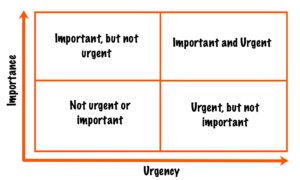Personal productivity is the cornerstone of all effective leadership. Personal productivity is the ability to manage yourself, manage your time, and manage your priorities to work at maximum performance. Only when you can optimize your own performance are you truly able to increase the performance of others.
In today’s competitive world, it’s crucial to enhance productivity; therefore, it’s essential to understand the exact definition of the term productivity. Some define productivity from an economic standpoint. Others consider it from a management perspective, while still, others view productivity from other perspectives relevant to their own situation. A simple definition, which is applicable to all businesses and individuals, is one that regards productivity as the measure of how efficiently products and services are provided. Productivity, in the broadest sense of the word, relates to the overall effectiveness of getting things done or doing them well. In a more narrow business sense, productivity is doing what it takes to earn more money. From a personal perspective, productivity enables you to earn your income, make progress, and become the kind of person you want to be. In general, productivity means making better use of the resources you have available; it means investing time in tasks, activities, or responsibilities that provide a high return to you and your organization. Productivity is determined by working on activities of maximum profitability, and activities of maximum profitability mean dedicating time to doing the right things, correctly, at the right time, and within a specific time frame. When you allocate time to activities of maximum profitability, you’ll be more productive. You’ll be working smarter rather than working harder!
A company is productive when it increases profits, not just operational efficiency. Regardless of your business, profession, or career—whether you manufacture or sell a product or provide a service—improving your productivity is the driving force for continuous improvement. Continuous improvement enhances your sense of personal achievement, professional success, and pride in a job well done.
Because actions and behaviors stem from attitudes, an increase in productivity may require you to change some of the attitudes that currently influence your time management. Consider these time management practices that affect productivity and observe how attitudes are influencing them:
- Focus on High-Priority Activities: The fastest and most effective way to increase productivity is by spending your time on tasks that bring you closer to important goals. Ensure that your time is devoted to genuinely important work; otherwise, you may end up using it entirely on trivial matters. You can lose hours solving problems that could be addressed by others. Address the concerns raised by various team members by giving them the autonomy to solve their own issues. This approach saves you valuable time and gives others the opportunity to develop their commitment, a sense of ownership, and problem-solving skills. Help others use their time on high-priority activities, and concentrate your time and effort on high-priority activities that lead to goal achievement.

- Exercise Self-Discipline: Self-discipline allows individuals to stay focused on a task and work on it until it’s completed. Set your priorities and don’t allow distractions, interruptions, or current events to destroy your concentration. Maintain the discipline to give each task only the amount of time and effort it deserves, or delegate it to appropriate team members. Either of these alternatives requires careful evaluation and consideration—and conscious self-discipline. Particularly, perfectionists need to learn how to exercise self-discipline to delegate certain tasks to people who may not do them as well as they would, but who can meet essential quality standards. How else will someone learn to do this job if they are never given the opportunity to learn how to do it?
- Be Persistent: Careful planning and goal setting, a determination to achieve them, and an appreciation of the benefits of reaching a goal are all vital for your personal productivity. The combination of these factors allows you to be persistent, and persistence is always a characteristic of a successful person. Many people enthusiastically take on new jobs, new responsibilities, and new positions, making a strong initial impression and progressing rapidly, but they soon lose momentum, never finishing the job. In contrast, productive individuals set concrete goals, plan carefully, and focus their attention on the actions necessary to achieve each goal. Persistent individuals keep their goals in mind and work relentlessly towards them until they enjoy the satisfaction of achieving them.

- Get Started!: The best way to ensure the completion of a project is to start it now! There are two reasons why important tasks are not accomplished—people never start them or they never finish them. Both patterns of unproductive time are encompassed in the debilitating realm of procrastination. Several patterns of mistaken thinking explain most procrastination. Following these guidelines will help you avoid these pitfalls: Start the required work and continue it even if you “don’t feel like it.” Often, starting is the most challenging part of a task; once you’ve started, “inspiration” often follows. Thomas Alva Edison, the famous American inventor, explained it well when he said, “Genius is one percent inspiration and ninety-nine percent perspiration.” Confront the fact that some jobs will never be “easy”—not now, and not later. Break the task into logical steps to make it more manageable at each stage. Start the task, work systematically, and you’ll enjoy a sense of mastery that enables you to complete the job!
- Strive for Results, Not Perfection: Placing too much emphasis on perfection almost always leads to negative consequences. Fear of making mistakes, discouragement, and worrying about what others think sabotage productivity. Productive individuals distinguish between what’s important and what’s not. They allocate a reasonable amount of time to complete a specific task and then meet this deadline. They recognize that some tasks are simply not important enough to waste too much time and effort on. Even in genuinely important work, truly productive people simply strive for excellent results—not perfection. The goal-setting process offers the most effective method for implementing time management patterns that produce results. Goal setting allows you to identify your most significant achievements, set priorities, and take the actions necessary to achieve your goals.


Leave a Reply